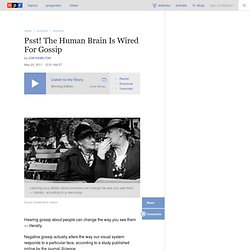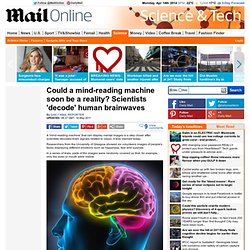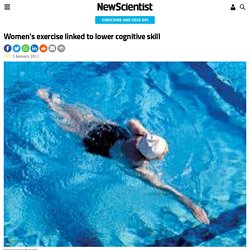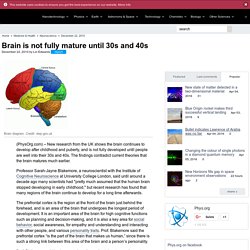

Religion May Cause Brain Atrophy. Faith can open your mind but it can also cause your brain to shrink at a different rate, research suggests.

Researchers at Duke University Medical Centre in the US claim to have discovered a correlation between religious practices and changes in the brains of older adults. The study, published in the open-access science journal, Public Library of Science ONE, asked 268 people aged 58 to 84 about their religious group, spiritual practices and life-changing religious experiences. Changes in the volume of their hippocampus, the region of the brain associated with learning and memory, were tracked using MRI scans, over two to eight years.
Protestants who did not identify themselves as born-again were found to have less atrophy in the hippocampus region than did born-again Protestants, Catholics or those with no religious affiliation. Psst! The Human Brain Is Wired For Gossip. Hide captionLearning juicy details about someone can change the way you see them — literally, according to a new study.

August Darwell/Getty Images Hearing gossip about people can change the way you see them — literally. Negative gossip actually alters the way our visual system responds to a particular face, according to a study published online by the journal Science. The findings suggest that the human brain is wired to respond to gossip, researchers say. And it adds to the evidence that gossip helped early humans get ahead. Uld a mind-reading machine soon be a reality? Scientists 'decode' human brainwaves. By Daily Mail Reporter Updated: 08:37 GMT, 18 May 2011 A 'mind-reading machine' that can display mental images is a step closer after scientists decoded brain signals related to vision, it was claimed today.

Researchers from the University of Glasgow showed six volunteers images of people's faces displaying different emotions such as happiness, fear and surprise. In a series of trials, parts of the images were randomly covered so that, for example, only the eyes or mouth were visible. Imaginary Foundation. 10 Websites With Fun Tests To Gauge Your IQ. Intelligence Quotient (IQ) is a term that’s related to the wattage of your brain; in short intelligence and reasoning skills measured across a few standardized tests.

Before an inferiority complex starts laying its foundation, remember that I.Q is not a measure of knowledge or its practical application. To rub our egos the right way, you might take a few serious approved tests and arrive at your IQ. Me? I don’t want to find out where I end up on the dunce scale, so I usually head to these fun tests to gauge my IQ. Brain Training, Brain Exercise, Brain Fitness by Brain Training 101. Smart-Kit: Online Puzzles & Games. Brain Teasers, Puzzles, Riddles, Trivia and Games. Brain Fitness and Cognitive Health Authority: Market Research and Advisory Services.
Where is The Mind?: Science gets puzzled and almost admits a non-local mentalscape. This will be the last "home-produced" blog entry for a while [save the short "Everyday Spirituality" which will follow it as a sign-off] .

Cognitive Atlas. Mindfulness meditation training changes brain structure in eight weeks. Participating in an 8-week mindfulness meditation program appears to make measurable changes in brain regions associated with memory, sense of self, empathy and stress.

In a study that will appear in the January 30 issue of Psychiatry Research: Neuroimaging, a team led by Massachusetts General Hospital (MGH) researchers report the results of their study, the first to document meditation-produced changes over time in the brain's grey matter. "Although the practice of meditation is associated with a sense of peacefulness and physical relaxation, practitioners have long claimed that meditation also provides cognitive and psychological benefits that persist throughout the day," says Sara Lazar, PhD, of the MGH Psychiatric Neuroimaging Research Program, the study's senior author. Women's exercise linked to lower cognitive skill - health - 07 January 2011. WOMEN who habitually take strenuous exercise might be at risk of damaging their cognitive function later in life.

Strenuous exercise is known to reduce oestrogen levels in women and girls. This can delay the start of menstruation, and can lead to irregular periods in adult women. Low levels of oestrogen in premenopausal women have been linked to impaired mental function in later life. Mary Tierney at the University of Toronto, Canada, reasoned that strenuous exercise might therefore lead to impaired cognition in later life. She asked 90 healthy post-menopausal women to report their life-long exercise habits, and then tested their cognitive ability. A fat tummy shrivels your brain - health - 08 January 2011. Intuition. Political views 'hard-wired' into your brain. Body of Thought: How Trivial Sensations Can Influence Reasoning, Social Judgment and Perception. Why do we look up to those we respect, stoop to the level of those we disdain and think warmly about those we love?

Watch Free Documentaries Online. Why do we think and feel as we do?

For years man has sought to understand the workings of the mind. Now, with advances in modern-day technology and developments in neuroscience, a whole new world of brain research is opening up. Understanding our minds is becoming a reality. Guided by top neuroscientist Susan Greenfield, Brain Story attempts to answer the question “What is my mind and who am I?” Brain is not fully mature until 30s and 40s. (PhysOrg.com) -- New research from the UK shows the brain continues to develop after childhood and puberty, and is not fully developed until people are well into their 30s and 40s.

The findings contradict current theories that the brain matures much earlier. Professor Sarah-Jayne Blakemore, a neuroscientist with the Institute of Cognitive Neuroscience at University College London, said until around a decade ago many scientists had "pretty much assumed that the human brain stopped developing in early childhood," but recent research has found that many regions of the brain continue to develop for a long time afterwards. The prefrontal cortex is the region at the front of the brain just behind the forehead, and is an area of the brain that undergoes the longest period of development.
Prof. Blakemore said brain scans show the prefrontal cortex continues to change shape as people reach their 30s and up to their late 40s. Neurotheology: This Is Your Brain On Religion. Principles of NeurotheologyBy Andrew B. NewbergPaperback, 284 pagesAshgateList price: $29.95 "Neurotheology" is a unique field of scholarship and investigation that seeks to understand the relationship specifically between the brain and theology, and more broadly between the mind and religion. As a topic, neurotheology has garnered substantial attention in the academic and lay communities in recent years. Several books have been written addressing the relationship between the brain and religious experience and numerous scholarly articles have been published on the topic.
The scientific and religious communities have been very interested in obtaining more information regarding neurotheology, how to approach this topic, and whether science and religion can be integrated in some manner that preserves, and perhaps enhances, both. Can't relax? It's all in your mind: Research shows stopping a thought puts more strain on the brain. (PhysOrg.com) -- Turns out, relaxing is exhausting—which could by why so many people struggle to unplug from work during vacation. According to mathematicians at Case Western Reserve University, stopping a thought burns more energy than thinking-like stopping a truck on a downhill slope. "Maybe this explains why it is so tiring to relax and think about nothing," says Daniela Calvetti, professor of mathematics and one of the authors of a new brain study published in an advanced online publication of the Journal of Cerebral Blood Flow & Metabolism. Since opening up the brain for detailed monitoring isn't exactly practical, Calvetti teamed up with fellow mathematics professor Erkki Somersalo and Rossana Occhipinti, a postdoctoral researcher in physiology and biophysics, to create a computer model of brain metabolism.
Calvetti and Somersalo created a software package specifically designed to study the complex metabolic systems. The Extended Mind. Andy Clark & David J. Chalmers [*] Department of Philosophy Washington University St. Louis, MO 63130 Department of Philosophy University of Arizona Tucson, AZ 85721 andy@twinearth.wustl.educhalmers@arizona.edu. Embodied Cognition Embodied Cognition is a growing research program in cognitive science that emphasizes the formative role the environment plays in the development of cognitive processes.
The general theory contends that cognitive processes develop when a tightly coupled system emerges from real-time, goal-directed interactions between organisms and their environment; the nature of these interactions influences the formation and further specifies the nature of the developing cognitive capacities. Since embodied accounts of cognition have been formulated in a variety of different ways in each of the sub-fields comprising cognitive science (that is, developmental psychology, artificial life/robotics, linguistics, and philosophy of mind), a rich interdisciplinary research program continues to emerge. Table of Contents 1. Motivation for the Movement 2. To say that cognition is embodied means that it arises from bodily interactions with the world.
A. I. Ii. Out of Our Brains. The Stone is a forum for contemporary philosophers and other thinkers on issues both timely and timeless. Where is my mind? The question — memorably posed by rock band the Pixies in their 1988 song — is one that, perhaps surprisingly, divides many of us working in the areas of philosophy of mind and cognitive science. Neuroscience and the Soul. TV Watching Is Bad for Babies' Brains. Babies who watch TV are more likely to have delayed cognitive development and language at 14 months, especially if they're watching programs intended for adults and older children.
A New Marriage of Brain and Computer. Hacking the brain by predicting the future and inverting... Toward the First Revolution in the Mind Sciences. Blue Brain Project. Think faster focus better and remember moreRewiring our brain to stay younger... Transform Your Mind, Change Your Brain. Your Brain at Work. How Brain Imaging Could Help Predict Alzheimer's. Developing drugs that effectively slow the course of Alzheimer’s disease has been notoriously difficult. Scientists and drug developers believe that a large part of the problem is that they are testing these drugs too late in the progression of the disease, when significant damage to the brain makes intervention much more difficult.
“Drugs like Lilly’s gamma secretase inhibitor failed because they were tested in the wrong group of patients,” says Sangram Sisodia, director of the Center for Molecular Neurobiology at the University of Chicago. Tuning In To The Brain's 'Cocktail Party Effect' Scientists are beginning to understand how the human brain accomplishes a remarkable trick known as the cocktail party effect.
It's what allows us to pick out the words from just one speaker even when we're in a room full of other voices that are just as loud. For decades, scientists have puzzled over how our brain is able to focus on certain sounds while filtering out others. Now they say they're finding clues, thanks to new research on birds and bats. Birds don't spend much time at cocktail parties, but they do face a similar auditory challenge, says Frederic Theunissen of the University of California, Berkeley.
Jacobson's organ. Neuroscience of free will. Navy: Grow Sailors’ Brains With iPhone App. Notes from the Undergrad. By Andrew Newburg | Yawn. Your personal homepage. 120 Ways to Boost Your Brain Power. Here are 120 things you can do starting today to help you think faster, improve memory, comprehend information better and unleash your brain’s full potential. Math Run - how fast is your brain? A simple Brain Training Game for everyone.
Games for the Brain. Bobby McFerrin hacks your brain with the pentatonic scale. Sporcle.com: mentally stimulating diversions. 7 Skills To Become Super Smart. People aren’t born smart. They become smart. Brain Games & Brain Training. Ways to Improve Human Intelligence. Your personal homepage. Treating people with phobias could be possible one day with better understanding of which brain regions fail to function normally when confronted with fear, say scientists.
Controlling Computers with Your Mind. Daily dose of beet juice promotes brain health in older adults. Zap of electricity makes you a brighter spark.